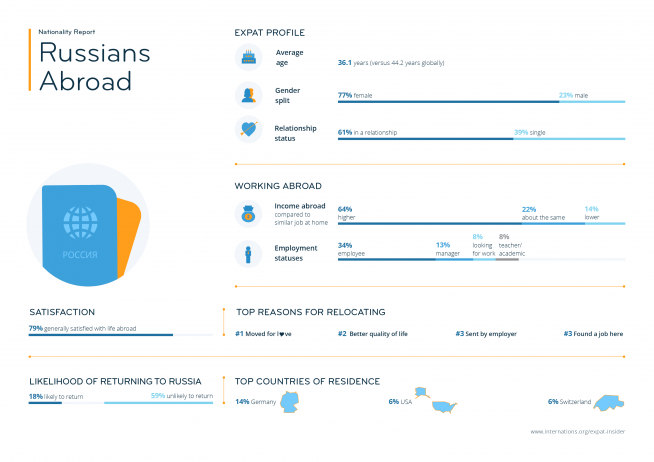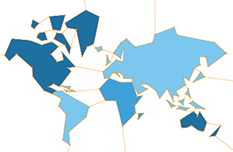Russians Are Moving Abroad for a Better Quality of Life
- 74% considered the living standards abroad a potential benefit.
- The majority of Russian respondents are women.
- It’s the first time living abroad for 37% of Russian expats.
- 64% earn more abroad.
- 37% speak the local language very well.
Looking Forward to a Warmer Climate
It seems that an improved quality of life is an important factor for many Russians choosing to move abroad. Not quite three-quarters (74%) state that they considered the general living standards in their host country a potential benefit before relocating, which is eleven percentage points above the survey average. Equally, close to four out of ten Russian respondents (38%) say that a better quality of life was one of their reasons for relocating, compared to just under three in ten worldwide (28%). Over four in ten Russian expats (42%) say they considered the political situation abroad a potential advantage of moving, while 65% agree that personal safety in their host country was a positive factor of moving.
Similarly, six in ten say they considered the climate and weather abroad a potential benefit before moving, compared to 45% worldwide: this is perhaps unsurprising, given the long and cold winters in many parts of Russia.
First Time Abroad, and Many Don’t Look Back
Over a third of Russian expats (37%) are living abroad for the first time, compared to the global average of 28%. It seems many are enjoying their expat experience, with close to four in ten (39%) saying they plan to stay possibly forever. Only 13% of Russians agree that it is very likely they will return home to Russia in the future, compared to 31% worldwide. For a noticeable share, the prospect of staying oversees indefinitely has potentially led them to acquire citizenship of their host country: close to one in five (18%) are now citizens of their host country, compared to the global average of 13%.
More Russian women are moving abroad than men, at least when it comes to the findings of Expat Insider 2018. The gender split for Russian expats stands at 77% female and 23% male — a significant disproportion, given that the general survey average is 51% female versus 49% male. The reason for this remains unclear, though perhaps it is linked to career prospects in Russia: 50% of female foreign nationals living in Russia rate their career prospects negatively; however, less than a quarter of male foreign nationals in Russia (24%) say the same. On a global scale, 28% of female respondents rate their career prospects poorly.
Earning More Abroad
The most popular fields of employment for Russians abroad include IT (17%), finance (12%), and language and translation (7%). In fact, the percentage of Russian expats working in language and translation is over three times the survey average (2%). More than six in ten Russian expats who work (64%) state that they earn more abroad than they would at home, compared to the survey average of just over half (53%).
However, in comparison to the global average, Russians do not have the highest household incomes — 13% report an annual 100,000 USD or more compared to 24% worldwide who say the same. And 26% of Russians share that they considered taxation in their future home a potential disadvantage before moving abroad, ten percentage points above the global average (16%).
In general, Russian expats work shorter hours: 41.8 for a full-time working week compared to the survey average of 44.0. An above-average percentage of expats from Russia have postgraduate or master’s degrees — 56% compared to the global average of 41% — in addition to 7% with a PhD.
Looking to Improve Their Language Skills
When it comes to learning the local language, Russian expats don’t seem to struggle: 37% speak the language of their host country very well, compared to the global average of 27%. Close to a quarter of Russian respondents (23%) say that it is very difficult to live in their host country without local language skills, which might explain why such a high proportion have mastered the local language of their respective countries of residence. Almost two in ten (17%) also agree that improving their language skills was an important reason for moving abroad, although just 1% name this factor as their main reason for relocating.
Younger Than Average and in the Expat Bubble
Perhaps due to the younger average age of Russian expats — 36.1 years compared to the global average of 44.2 years — fewer Russians are in a committed relationship: almost four in ten (39%) are single in comparison to 34% worldwide. Of the 61% who are in a relationship, over six in ten (62%) are involved with someone of a nationality other than their own. In general, 43% met their partner in Russia, while 38% met them in the country in which they are now residing.
When it comes to making friends abroad, it seems that Russian expats struggle somewhat to escape the so-called expat bubble. In comparison to the global average of 34%, 43% of Russians abroad say they are mostly friends with other expats, while just 13% agree that they mainly mix with local residents.




